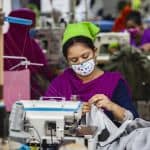A Vaccine Is Not the Only Answer to COVID-19: Why Strengthening Statistical and Data Systems Must Be Part of the Solution
The world’s inability to detect and contain the spread of COVID-19 has been financially devastating. The International Monetary Fund says that the global economy will shrink by 3% this year. Many analysts have described the decline as the worst since the Great Depression of the 1930s, with 42.6 million people applying for unemployment benefits in America alone. And looking ahead, a study from the Centre for Risk Studies at the University of Cambridge Judge Business School determined that the potential global economic toll could range from what it called an “optimistic loss” of $3.3 trillion in case of rapid recovery, to $82 trillion in the event of a depression.
With these losses, budgets are tightening around the world. Prioritization of essential spending is more critical than ever, and many governments and organizations are understandably placing their hopes in the development of an effective vaccine. But as much as a vaccine is needed to address the pandemic, accurate and real-time data is needed to enable the detection and containment of its spread. And governments and development organizations can do more to better strengthen statistical systems by providing adequate financing.
The Importance of Statistics in Combatting COVID-19
Strong national statistical systems can provide information to monitor and track progress towards achieving the Sustainable Development Goals (SDGs), but high-quality data have also proven to be a critical weapon against the spread of COVID-19. Leveraging these data effectively can help safeguard the functioning of economic industries and ward off an impeding global depression. But despite the strong case for more and better financing for statistical systems, major gaps exist in the availability of data in many countries, driven by a severe and ongoing deficit in financing.
This cycle of underfunding is largely responsible for weak statistical systems all over the world, which are failing to produce the required data to inform efforts to detect and contain the spread of COVID-19. In theory, the data required to measure progress towards the SDGs should provide a solid foundation to also monitor the spread and impact of COVID-19. But previous studies have shown that national statistical offices don’t actually have the funding to fulfill the data demands of the SDGs. According to estimates by the Sustainable Development Solutions Network TReNDS, Open Data Watch and the Global Partnership for Sustainable Development Data, efforts to monitor the SDGs face a data financing gap of $635-685 million per year. Another study on the state of gender data financing by Data2X shows that data on women and girls, disaggregated by sex and other attributes, also face glaring gaps due to under-investment.
It is not just the need to safeguard the economy that drives the need for investment in statistics; supporting the data systems that will underpin global health policymaking and beyond is a vital public good. For instance, civil registration and vital statistics (CRVS) systems are a key part of countries’ overall statistical systems, and they can provide immense benefits for understanding public health crises – but they remain woefully underfunded. Existing CRVS systems generate death registration and cause of death data, which serve as one of the most basic health statistics necessary to monitor and fight global health crises. Yet two-thirds (38 million) of 56 million annual global deaths are still not registered, and only 40 of 194 countries in the world report high-quality cause-of-death data to the WHO. Understanding COVID-19’s mortality rate is an opportunity to track and curb its spread. Therefore, investing in these data resources in low-income countries, where death registration rates are insufficient to provide this vital information, is crucial to fighting the current pandemic.
Strengthening Statistical Systems During – And After – The Pandemic
But while COVID-19 may be the immediate challenge, it is not the only threat to long-term development. The virus’s ability to weaken our statistical systems and undermine our ability to react to crises in the future is menacing as well – and the data we’ll need to respond to tomorrow’s needs must not be forgotten. Stay-at-home orders and global lockdowns are placing added strain on the normal orders of operation of statistical exercises such as census programs and surveys. National statistical offices are struggling to adapt their door-to-door household survey methods to electronic or mobile platforms in response to these constraints, but they risk serious delays in producing the data. Investing in and strengthening all sections of these statistical systems can’t be overlooked, or the next global health emergency will find the world similarly unprepared.
The need for increased investment is as clear as the benefit of stronger statistical systems. It’s time for action – the main question is where to start? Partnerships with private sector actors are an untapped area of potential. Private companies are eager to help governments track COVID-19 and there are a handful of models for how governments and the private sector can work together to fill data gaps. And philanthropies like the Hewlett Foundation, which is a significant supporter of building statistical capacity, has outlined solutions such as the portfolio approach to successful investments. As Sarah Lucas, program officer at Hewlett, describes it: “A strong portfolio needs to optimize across a set of investments — filling data gaps, increasing capacity and incentives for data use, addressing challenges like interoperability to get maximum value from each data product (with help from this practitioner’s guide from GPSDD and the UN Statistical Division), and overcoming policy and legal barriers.”
All stakeholders looking to better understand how to fund national statistical systems should look to ongoing initiatives such as the Bern Network, a global alliance working to help find the funds national statistical offices need to address this and future crises. To close the knowledge gap in funding the statistical sector, the Bern Network is exploring the potential of a clearinghouse for financing development data. This approach would support a better and greater allocation of resources for data, by providing timely information and services to better match the supply and demand for statistical support. The clearinghouse would tackle the issues of lack of transparency in measuring the current investments in the data funding landscape, while improving coordination and alignment among the various stakeholders providing support for statistics.
Several initiatives are working to generate funding for the global pandemic response, including innovative financing models by international financial institutions, such as the African Development Bank’s US $3 billion COVID-19 social bond, the World Bank’s complementary US $14 billion COVID-19 response plan to the Pandemic Emergency Financing Facility, and others. Philanthropies such as the United Nations Foundation and the Swiss Philanthropy Foundation, and private companies such as Cisco Systems and Facebook have also been playing a major role by contributing to the COVID-19 Solidarity Response Fund, which as of June 24 had raised nearly $224 million. Imagine the benefits if just a small portion of these funds were allocated to strengthening statistical systems.
Improving statistical systems will require partnership and an increase in investment from domestic resources, such as taxes and budget allocations, official development assistance, and philanthropic and private sector players. A joint responsibility rests on all our shoulders to create better data systems around the world. COVID-19 is not the first pandemic, and it will not be the last. What this emergency has made clear is that our global statistical systems are unprepared for a challenge of this magnitude. We owe it to ourselves – and to those who will come after us – to invest in statistical capacity today in order to prepare for tomorrow.
Deirdre Appel is Program Manager and Shaida Badiee is Co-Founder and Managing Director of Open Data Watch.
Photo courtesy of Markus Spiske.
- Categories
- Coronavirus, Impact Assessment



